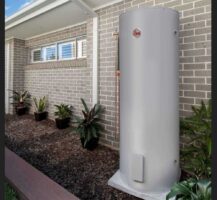Global investment bank HSBC has coined a new expression: 2°C finance. It uses it to describe massive licks of capital that will flow into low carbon investments – a tipping point that is nearing as renewable energy costs fall, the world edges towards a “Universal Climate Agreement” in Paris next year, and governments realise the cost of doing nothing.
In a new report dubbed Keeping it Cool; Financing a 2°C World, the economists at HSBC says there is now clear momentum towards a low-carbon global economy.
“We think the drivers for the transition are falling in to place now,” they write.
“1 We have the real possibility of a universal climate agreement to be signed in Paris in December next year;
“2 The cost of renewables has fallen significantly even before the full costs to the economy (of high-carbon) are priced-in; and
“3 We are beginning to understand how to better price-in other climate risks which would make low-carbon options not just economical but also beneficial.”
Australia might have been well placed to benefit from this and attract some of the hundreds of billions of 2°C finance – money that HSBC says is consistent with a 2°C world – given its carbon price, renewable energy target, and other measures.
Those, however, are now either gone (in the case of carbon pricing) or neutered (in the case of renewables). Energy efficiency schemes are being wound back, and in their place is the government’s controversial Direct Action plan – capped at $2.5 billion – and the Green Army, a program of cheap young labour for environmental projects.
The HSBC report highlights a couple of key factors of a low-carbon economy, and what it means for governments. Here are a few of them, and an observation from RenewEconomy on how the Australian government will be doing.
HSBC: The path to a low-carbon economy means increasing energy efficiency, scaling up low-carbon energy provision and embedding resilience to the consequences of warmer temperatures. The idea is to lower the chances of the most catastrophic climate system effects (through reducing emissions) as well as prepare for some of the impacts.
RE: Australia lags the world on energy efficiency measures, particularly in relation to vehicles and transport. Coalition governments have dismantled basic housing requirements, and the federal government is yet to act on the national energy efficiency plan. Despite all this, consumption per household has fallen more than 10 per cent in the last few years, mostly because people have installed rooftop solar and have bought more efficient appliances.
HSBC: In a 2°C world, the development of energy would take into consideration both the benefits of energy access (e.g. education, economy, time saved and spent doing other things etc.) as well as the associated costs with certain types of energy (e.g. health, climate change, pollution).
RE: Australia is not doing too well on that. It has deliberately ignored climate change and health impacts in its consideration of the renewable energy target, and sought to dismantle the Climate Change Authority (which thinks about these things) and has already abolished the Climate Commission and cut funding to the CSIRO, the leading scientific body. The only criteria for the RET Review was the cost to coal generators.
HSBC: The concept of co-benefits has gained momentum in recent years. For example, tackling the sources of pollution in China helps tackle climate change at the same time. Alternatively, tackling climate change through policy and innovation could bring other co-benefits such as reduced health costs (since the sources of pollution and climate change are similar).
A recent study by MIT, published in Nature Climate Change, finds that the “co-benefits…. May offset some or all of the near-term costs of GHG mitigation.” For instance, the study finds that a cap-and-trade system might cost $US14 billion, but the associated air pollution health benefits from implementing this system could be of the order of $US139 billion. For reference, $US6.5 trillion was spent globally on health in 2010 (WHO).
RE: Co-benefits have not entered the vocabulary of the Coalition government, with climate change deniers advising it in four key industry areas – banking and finance, renewable energy, business, and budget measures.
HSBC: The three main reasons why capital has not been channeled in the right direction for a low-carbon economy, historically, are: unfavourable economics for low-carbon, weak policy signals and the uncertain timing of high CO22 impacts.
RE: Australia exemplifies this. Having attracted billions of dollars in low-carbon investments in recent years, thanks to the short-lived carbon price and the renewables target, that capital is now drying up, with major international companies leaving, or warning they will direct capital elsewhere. Only households, keen to offset rising electricity bills, are keeping up momentum, although this is largely confined to rooftop solar and LED lighting.
HSBC goes on to say:
“The 2°C panacea won’t happen overnight, nor will it be free, but going forward we believe that it is important for financial flows to demonstrate that the economic system is moving in the right direction. Over the near term, it will be more expensive than implementing “business as usual” but over the long run, it should be less costly.
“Studies on how much this will cost range widely. In 2013, the World Economic Forum Green Investment report estimated that the ‘additional investment needed to meet the climate challenge– for clean energy infrastructure, sustainable transport, energy efficiency and forestry–is about USD0.7 trillion per year.’
“Another study published in Climate Change Economics in November 2013 found that ‘policies consistent with a 2°C climate change target would require…. $US0.8 trillion per year’.
“Currently, policy and history tip the balance in favour of high carbon, for example, through fossil fuel subsidies or the perceived lower risks of carbon-intensive technologies.
“While low-carbon adoption is not yet widespread, we think that the dynamics are set for tipping the balance more in favour of 2°C finance. In some regions, the economics already add up, but in many cases they still need to be helped towards more favourable risk-reward characteristics.
“Over the longer term we expect carbon to be priced and this should naturally favour lower carbon projects. In addition, the carbon price should rise as climate policies change (e.g. subsidy removal; increased urgency of reacting to the climate impact) and the external costs of high carbon projects are better priced-in (i.e. pollution damage, health costs). Essentially, we think it’s going to become more expensive to emit in the future.
“Pricing carbon is a slow process. In the meantime, the rewards can be enhanced by giving low-carbon a “leg up” via mechanisms like feed-in-tariffs. To make these work, policy commitment is key since policy drivers can create the right signals to grow markets and increase revenue potential. For example, targets for renewable energy as a percentage of the overall energy mix.”
HSBC argues that a climate agreement in Paris next year would be a key policy signal that shows political commitment to the transition to a low-carbon world. As a result, both industry and financiers should then be more willing to invest in projects that help deliver this transition because they would come with more assurance that the associated returns are less risky.







